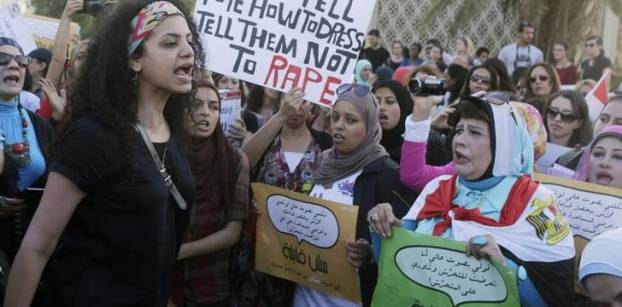Anti-sexual harassment groups absent from the streets during Eid

Women chant slogans as they gather to protest against sexual harassment in front of the opera house in Cairo June 14, 2014. REUTERS/Asmaa Waguih
CAIRO, Sept 14 (Aswat Masriya) - Anti-sexual harassment initiatives are absent from the streets during Eid due to the difficulty they faced in receiving permits from the Interior Ministry to help secure streets and public squares, organisers said.
Since it was founded in 2012, I Saw Harassment, or "Shoft Taharosh" in Arabic, has been active on the streets during the holidays, when sexual harassment is rampant in the public space. This is the first year that I Saw Harassment are not present in the streets.
"Although the amount sexual harassment has not decreased over the years," Shabaan Gamal, the deputy general coordinator of the group said, "there is nothing being done to combat this phenomenon."
"There's difficulty to even communicate with the Interior Ministry about this, and we cannot be in the streets without at least some communication with them because then we are at risk, and we are unprotected," Gamal explained to Aswat Masriya.
Imprint Movement, or "Bassma" in Arabic, another initiative that tackles gender-based violence, had a similar concern and cancelled an event they had organised for the holidays and that was part of their campaign, "A safe Eid without harassment."
The group had to put an end to their on-the-ground activities, limiting themselves to online activity because of what they described as the lack of "coordination" with the Interior Ministry.
"The campaign wouldn't have the same results if it were only awareness-based and we had 65 volunteers but had we had to cancel the event," Abdel Fattah Sharkawy, the director of the movement said.
Another initiative dubbed Aman, which is translated into Safety, launched a viral hashtag on social media that says "we want the street safe."
The campaign is targeting men in two ways; the first through encouraging them to stand in solidarity with women who fall victim to harassment, and "to stand up when they see harassment, to testify as witnesses to it, and to spread awareness about it," Fathi Farid, the founder of Aman, told Aswat Masriya.
"Because men are the main perpetrators of this crime, it is also telling them that it is unacceptable," Farid said. Yet the campaign, he added, "is unfortunately only on social media."
This is because the group still does not have enough necessary resources but it is also because, "there is an animosity between civil society and Egypt's executive forces at the moment."
He explained that at first this animosity took the form of harassment from the Interior Ministry, but now they don't even allow civil society to be present in the streets.
There was also a consensus among anti-harassment groups that street presence would put their volunteers at risk. Volunteers are likely to be arrested on charges of breaking the protest law.
While Imprint had been present on the streets during the first day of Eid, it canceled its activities on the second day, due to the harassment of its volunteers, the movement said in a statement.
Imprint said that since their groups were not secured, they were subjected to harassment, with their female volunteers particularly subjected to sexual harassment themselves.
The absence of such groups is also felt in the lack of reports on sexual harassment incidents this Eid.
On their part, the Interior Ministry has been deploying more female police officers to fight sexual harassment during the holidays. According to the state-owned Al-Ahram newspaper, there were 45 cases of harassment caught on the first day of Eid.
However, Farid argued that "They are boasting that there are female cops on the streets. But really there's no strategy. We don't know if these people are experienced in the field of gender-based violence. They are not qualified. How do they define harassment? Is it according to the vague and unclear domestic laws?"
While sexual harassment was criminalized for the first time in 2014, with a law that imposes a jail term of at least six months and a fine of at least EGP 3,000, the law remains largely unimplemented. According to Gamal, even when women file cases against the men who harass them, few continue with the cases until the end.
Farid also put to question what he said was "false media rhetoric of the Interior Ministry that says harassment has decreased greatly, or has ended. Reality shows that this is simply not the case." He added that this rhetoric has discouraged women from reporting cases of harassment because they will often think, "this is only happening to me."
A 2013 study by UN women found that that 99 percent of women in Egypt have experienced harassment, while in 2012 the National Council for Human Rights said that 70 percent of Egyptian women are harassed in the streets, public spaces and transportation.









facebook comments